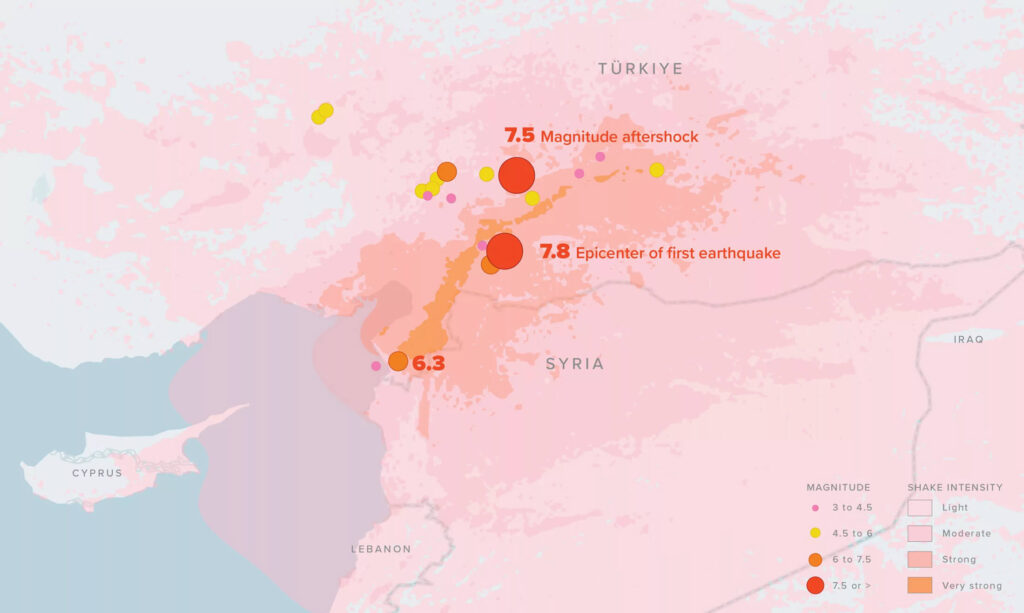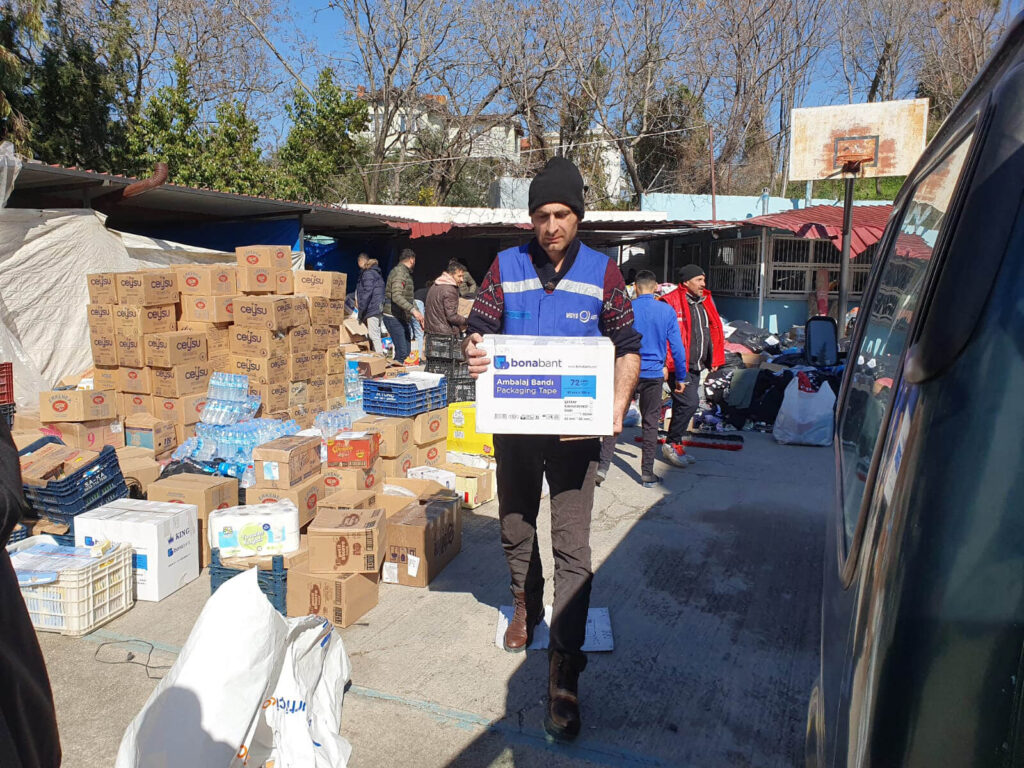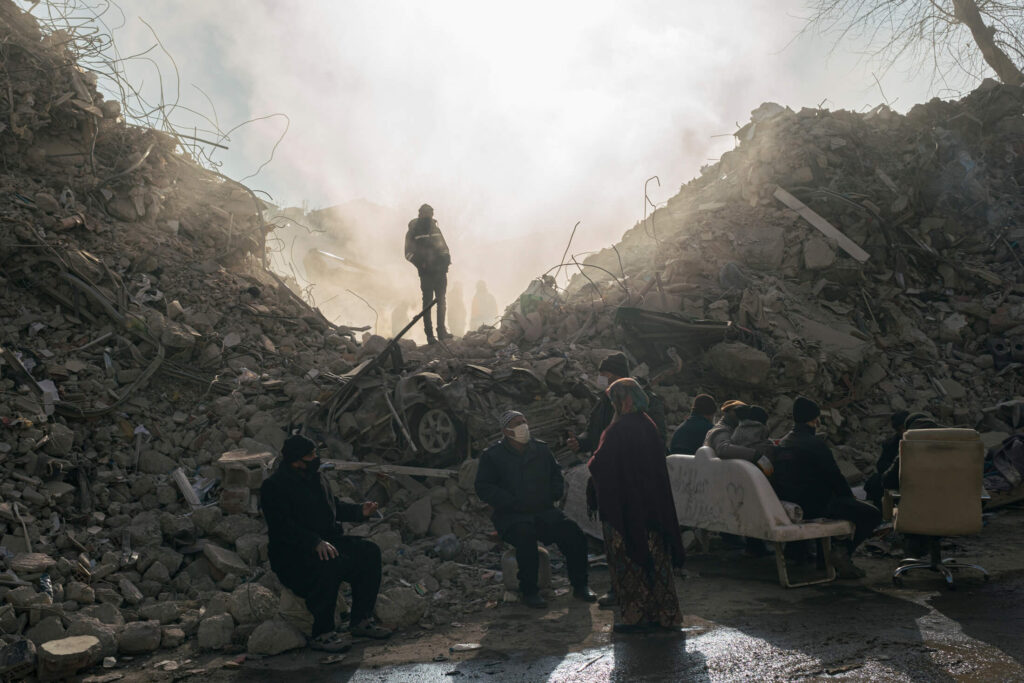On February 6, 2023, two earthquakes—7.8- and 7.5-magnitude—struck Syria and Türkiye, followed by more than 570 aftershocks over the next 24 hours.

The earthquakes resulted in:
- more than 56,000 deaths, with many thousands more injured
- nearly 245,000 buildings being damaged or completely destroyed
- the displacement of 5.6 million people
- an estimated $39.3 billion in damages
- further limits on access to healthcare, with more than 170 health facilities in Syria damaged and non-functional
- further damage to water and hygiene infrastructure—increasing the risk of waterborne diseases, such as cholera
- additional burdens for people suffering from an ongoing complex humanitarian crisis in Syria—including a 12-year civil war, financial crisis, food insecurity, COVID-19 and a new cholera outbreak
Since the quakes, International Medical Corps has provided critically needed health, mental health, protection, nutrition, and water, sanitation and hygiene (WASH) services in Syria and Türkiye. International Medical Corps is:
- operating mobile medical units (MMUs) and mobile surgical teams to provide health services in camps and temporary shelters
- supporting health facilities in quake-affected areas by providing critically needed medicines, medical equipment, supplies and training
- ensuring around-the-clock access to trauma care, mental health and psychosocial support (MHPSS) and other services for affected people
- providing specialized care and support to vulnerable women and children through gender-based violence (GBV) protection and support services, child protection (CP), women’s reproductive health services and nutritional support
- improving WASH services to lower the risk of waterborne diseases
Our ImpactOver the course of our response to the earthquakes, as of December 31, 2023, International Medical Corps has:
|
Our Response in Syria
International Medical Corps has worked in Syria since 2008, providing healthcare and MHPSS services, distributing hygiene-related non-food items (NFIs) and training health workers. Before the earthquakes, more than 15 million people in Syria already were in need of assistance—since the quakes, that number has increased to more than 16.5 million.
Health
Many hospitals in Syria were left non-operational due to damage from the earthquakes, severely limiting access to health services. We have responded in a number of ways.
Mobile Medical Units
We have been providing continuous primary care and integrated health services through MMUs for people in Aleppo, Hama and Latakia governates—including internally displaced persons (IDPs) living in camps and shelters. We have:
- deployed 24 MMUs that provided health consultations, as well as MHPSS, protection and nutrition services
- deployed a mobile surgical unit to provide surgical services to 813 internally displaced persons (IDPs) in shelters and camps
- delivered 393,769 emergency, outpatient, primary and surgical consultations




Physical Therapy and Rehabilitation (PTR) Services
The infrastructure damage caused by the earthquakes led to serious injuries that required both emergency care and PTR services, including orthopedic stabilization, physical therapy sessions, training of caregivers and mobility aids. In response, we have:
- deployed 10 PTR MMUs and established three static PTR facilities
- provided 5,574 people with physical therapy and rehabilitation services
- procured and distributed 1,754 pieces of orthopedic equipment—including crutches, wheelchairs and neck braces
- trained 2,659 caregivers on how best to assist family members and friends with disabilities
Health System Support
We are supporting local health facilities that are still functioning after the quakes, and have:
- delivered more than 9.6 million items of medicines, medical equipment and supplies to support 87 health facilities
- equipped an operating room and a maternity ward at Al-Razi Hospital, and an operating room at the National Hospital in Latakia
- deployed 10 ambulances to support referrals for 4,641 people requiring specialized medical services
- distributed more than 92,000 NFIs to IDPs, including blankets, food baskets, diapers, towels, hygiene kits and winter clothing
Mental Health and Psychosocial Support
More than 1 million people in Syria need mental health support—but the number of available psychologists in the country is low. In response, we have:
- deployed 16 mobile MHPSS units and supported seven static MHPSS facilities, providing case management, consultations, community-based activities, referrals and psychotropic medications
- conducted 24,757 individual mental health consultations
- provided specialized care to 3,595 people living with mental, neurological and substance-use disorders
- deployed 15 specialized mobile PFA units staffed by psychosocial, CP and GBV specialists
- provided PFA to 16,898 IDPs in temporary accommodation centers
- reached 2,528 women and children through MHPSS support groups and recreational activities
- trained 726 health workers on how to promote positive mental health habits among patients
- continue to operate a 24-hour MHPSS hotline in affected areas—reaching almost 500 people so far
Nutrition, Gender-Based Violence and Child Protection
The quakes have led to food insecurity for more than 50% of the Syrian population. Additionally, the quakes exacerbated gender inequality and increased protection risks for children. In response, we have:
- provided 41,722 pregnant women, caregivers and children with nutrition interventions—including counseling and re-lactation sessions
- distributed nutrition supplies to 21,313 women and children
- operated 10 safe spaces for women and children, providing MHPSS services, group activities, maternal and newborn health information, recreational activities and referrals
- provided 1,475 women and children with GBV-CP case management and GBV and maternal-health sessions
- distributed 8,115 dignity kits to 5,470 women and girls
- reached 630 youth through youth empowerment programs, and 461 adolescent girls with life-skills sessions
- reached 3,740 women and girls through GBV awareness-raising sessions, covering topics such as safe maternity practices, nurturing positive relationships with parents and peers, decisionmaking skills and prevention of child marriage
- supported 3,950 women, children and caregivers facing financial hardship through our individual protection fund, providing almost $200,000 in financial support


Water, Sanitation and Hygiene (WASH)
Even a slight gap in access to clean water, as well as sanitation and hygiene facilities, can lead to poor health outcomes and the spread of disease while exacerbating existing vulnerabilities. In response, we have:
- installed eight latrines and sanitation facilities, serving 1,148 people at one IDP camp
- provided more than 907,000 liters of clean water and distributed 300 hygiene kits to prevent the spread of communicable diseases
- provided oral rehydration solution to 8,647 people to prevent or cure cholera and acute watery diarrhea
- reached 11,633 people with hygiene-related education sessions
Our Response in Türkiye
International Medical Corps worked in Türkiye from 2012 until 2018, with extensive programs in the southern areas of Gaziantep, Hatay, Kilis, Mersin and Sanliurfa. Through the help of valued partners, we resumed work in Türkiye within 24 hours of the quakes. A year later, more than 50% of the earthquake-affected people of Türkiye are still in need of humanitarian aid.
Health
We partnered with local organizations, including the Association of Assistance Solidarity and Support for Refugees and Asylum Seekers (MSYD-ASRA), International Blue Crescent (IBC) and Yeryüzü Doktorları (YYD), to provide health and mental health services. Together, we have:
- delivered 23,663 items of medicines, medical equipment and supplies to the three primary health facilities supported in Gaziantep, Hatay and Kahramanmaraş
- provided 28,641 health consultations—including first aid, emergency care and disease prevention
- deployed four PTR MMUs and provided 1,016 people with physical therapy and rehabilitation services in Gaziantep, Hatay and Kahramanmaraş
- procured and distributed 78 pieces of orthopedic equipment—including crutches, wheelchairs and neck braces
- trained 449 caregivers on how best to assist family members and friends with disabilities, and provided training
Mental Health and Psychosocial Support
The earthquakes brought both immediate and long-term health and mental health impacts to Türkiye. We have:
- reached 22,454 people with integrated health and MHPSS services—including primary and emergency healthcare, physical rehabilitation and disease prevention
- provided MHPSS consultations for 9,911 people
- reached 10,180 children through support groups and recreational activities
- created five safe spaces for children and adolescents to interact with each other and express emotions through creative arts and physical activities
- reached 8,980 people through psychoeducation sessions



Water, Sanitation and Hygiene (WASH)
In response to WASH-related needs in Türkiye, we have:
- installed 304 latrines and sanitation facilities, serving 18,305 people in eight camps in Hatay province
- distributed 98,280 liters of drinking water to IDPs in Gaziantep province, one of the hardest-hit areas
- distributed essential items to 2,150 to IDPs, including blankets, food baskets, diapers, towels, hygiene and water purifications kits, and winter coats

Long-Term Support
|
